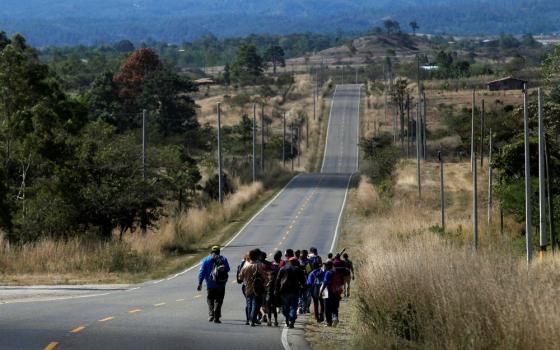A group of about 75 people, including two dozen women religious, will travel to Honduras in what is being billed as a "reverse caravan" to see for themselves why tens of thousands of people have fled for their lives.
The interfaith trip, March 18-25, is sponsored by the Leadership Conference of Women Religious, SHARE el Salvador (Salvadoran Humanitarian Aid, Research and Education Foundation), the Sisters of Mercy of the Americas and the Interfaith Movement for Human Integrity.
"It's not my first trip to Honduras, by any stretch, but it is my first with the SHARE Foundation, and I expect my eyes will be open and my heart will be broken," said Sr. Ann Scholz, LCWR's associate director for social mission and a School Sister of Notre Dame. "I hope for a real encounter in a spiritual sense."
Called the Interfaith Root Causes Pilgrimage, the journey is timed to mark th 39th anniversary of the martyrdom of St. Óscar Romero. Romero was archbishop of San Salvador when he was assassinated March 24, 1980, for speaking out on behalf of people kept poor; tens of thousands of people have fled El Salvador and Honduras in recent years. From 2010 to 2015, for example, 240,000 people left El Salvador; in that same period, 80,000 left Honduras, according to data from the U.N. population division.
"I expect everybody who goes will be touched deeply," Scholz said. "This is designed to be a pilgrimage, and encounter is always an integral part of that. You make a pilgrimage to see the face of Christ — particularly in the suffering of the stranger."
The delegation will be hosted by women religious of Honduras and Jesuit Fr. Ismael Moreno — known as Padre Melo — of Radio Progreso. They will visit communities impacted by the repression, militarization and impoverishment that compels so many people to flee their homes in search of safety, many of them traveling thousands of miles to seek asylum in the United States.
Scholz said LCWR has a long relationship with SHARE and usually partners with them to organize trips to El Salvador to commemorate the four church women who were martyred. On Dec. 2, 1980, eight months after Romero was gunned down while saying Mass, Ursuline Sr. Dorothy Kazel, lay missioner Jean Donovan, and Maryknoll Srs. Maura Clarke and Ita Ford were kidnapped and murdered by government soldiers.
Honduras can be dangerous, Scholz said, but since the group was invited by a priest and a fellow School Sister of Notre Dame, she believes they will be safe as they meet with faith leaders, grass-roots organizers, activists, youth and women's groups.
"I think that gives our pilgrimage both legitimacy and some degree of protection," she said. "We will not be wandering aimlessly about."
Since a coup in 2009, Honduras has been beset by drug cartels, organized crime, violence and corrupt security forces.
Sr. Margaret Farrell, a Religious Sister of Charity, decided to go on the trip because she has always been interested in issues of social justice and in Romero. Farrell works in Los Angeles for Covenant House, an international organization that operates shelters for homeless youth.
"I often work with the immigrant community," Farrell said, "so I've been very aware of the issues. I'm very familiar with why people are forced to leave — they're fortunate to get out with their lives."
While in Honduras, Farrell will travel with a smaller group to a mining area to learn how mining activities are displacing the people who live in the area. Farrell and other sisters on the trip plan to write about their experiences for Global Sisters Report.
Covenant House operates two shelters in Honduras, Farrell said, but she doesn't know if she will be able to visit while she's there.
Rev. Deborah Lee, Executive Director of Interfaith Movement for Human Integrity, said in a statement announcing the trip that the experience will help people understand that those seeking asylum in the United States have no choice: They must flee or die.
"We envision a world where migration is not forced, nor criminalized, but rather understood as a choice for self-determination and survival," Lee said in the statement. "It is for us to come face to face with our own country's complicity in the root causes driving forced migration."
Jose Artiga, director of the SHARE Foundation, said in the statement that those on the trip will carry the spirit of Romero and Berta Caceres, an indigenous environmental activist who was murdered in March 2016.
"They both called for an end to the repression," Artiga said. "St. Romero is with the people of Honduras today who are struggling for a dignified life and an environmentally sustainable future for their country."
[Dan Stockman is national correspondent for Global Sisters Report. Follow him on Twitter @DanStockman or on Facebook.]

